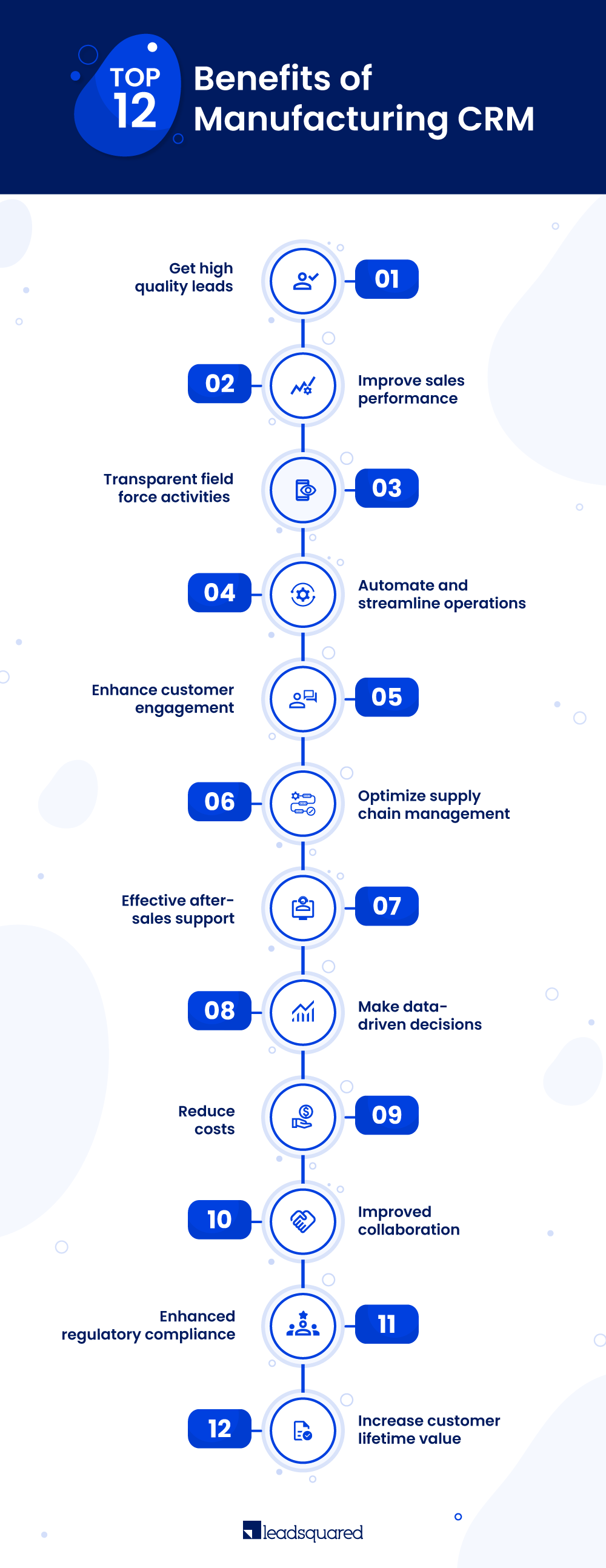In the past, manufacturing giants like Asian Paints would have never imagined themselves answering customer calls directly. However, the days of dealers being the sole point of contact with manufacturers are long gone.
The manufacturing industry has undergone a significant shift towards customer-centricity in recent years. And manufacturing CRMs have played an important role by helping businesses improve their processes.
However, many people still see CRM as just a customer relationship management software. In contrast, manufacturing CRM benefits businesses in many ways, including streamlining processes and optimizing overall manufacturing operations.
Before we get into its benefits, let’s first understand what a manufacturing CRM does in detail.
What is Manufacturing CRM?
Manufacturing CRM is software designed to address the unique challenges and opportunities faced by manufacturing organizations. It is generally used by the sales and marketing teams, but can be extended to other teams like operations, aftersales or customer support, and call centers to build one ecosystem. It goes beyond traditional CRM functionalities to offer solutions like:
- Capturing and storing customer data
- Tracking customer interactions
- Dealer management
- Marketing automation
- Sales funnel visibility
- Supply management
- Advanced reporting
And the list goes on! As a result, the industry’s current investment trends for CRM software are impressively high. The market is anticipated to expand at a CAGR of 13.9% from 2023 to 2030. This is because the manufacturing CRM software is customizable and a perfect fit to cater to the industry’s complex operational requirements.
Let’s discuss the benefits of manufacturing CRM solutions in detail.
Top 12 Benefits of Manufacturing CRM

1. Get high-quality leads
A manufacturing CRM streamlines your lead management process and helps you identify high-quality leads that are more likely to convert. It captures leads from various sources onto a single platform and tracks their interactions with your business.
Then, the CRM assigns a score to each lead based on their engagement level. These scores help you prioritize leads and increase manufacturing sales. Essentially, the CRM ensures that your team focuses on the most promising leads, while saving time and boosting overall sales performance.
2. Improve sales performance
In a survey, 75% of sales managers said they had seen tremendous growth in sales performance after adopting CRM solutions. It empowers sales teams with a holistic view of customer information to curate a well-informed pitch. They can track interactions and identify potential opportunities more effectively. Real-time tracking of sales pipelines and automated reminders also contribute to an increase in sales performance and revenue growth.
3. Transparent field force activities
65% of companies with a mobile CRM reach their sales quotas, according to a Nucleus Research report. You can effortlessly manage field force activities with a mobile CRM solution. It allows you to create beat plans, track check-ins and check-outs, record face-to-face meetings, make notes, and more on the go.
4. Automate and streamline operations
Automating manufacturing workflows saves time and reduces errors to build a more efficient process.
CRM software also provides a centralized and real-time platform to manage processes across different teams like sales, marketing, dealers, operations, etc. With more transparency in the process, you can identify areas for improvement and allocate resources accordingly.
5. Enhance customer engagement
Manufacturing CRM enables proactive engagement and personalized communication. You can tailor your communications and offerings by tracking customer interactions and history. This helps you meet your customer’s needs, foster stronger customer relationships, and increase buyer satisfaction.
6. Optimize supply chain management
Manufacturing CRM can also help you resolve supply chain management issues by integrating with existing systems. By digitizing the vendor onboarding process, CRM software makes collecting and verifying documents quick and easy. It also provides real-time visibility into inventory levels, production schedules, logistics, and delivery.
The enhanced visibility enables manufacturers to make informed decisions on production schedules and identify supply chain issues to optimize the entire process.
7. Effective after-sales support
Manufacturing CRM enhances after-sales support by providing a single customizable dashboard to manage customer information and inquiries. It offers easy access to services, interactions, warranty claims, and product returns. This way, customer service representatives can quickly access relevant data and resolve issues promptly while maintaining customer satisfaction and loyalty.
8. Make data-driven decisions
Manufacturing CRM collects and analyzes vast amounts of data from various sources, including sales transactions and production activities. It then creates easy-to-read, customizable reports for valuable insights into customer behavior, market trends, sales trends, and production efficiency. It empowers senior leaders and managers to make informed decisions about product development, production, and sales or marketing strategies.
9. Reduce costs
All the above benefits, like streamlined operations, optimized supply chain management, and improved sales performance, lead to overall cost reductions. By improving efficiency, manufacturers can save resources and allocate them more effectively, boosting profitability.
10. Improved collaboration
Manufacturing CRM fosters collaboration among departments, including sales, marketing, production, and customer service. By providing a shared platform for information exchange and task management, it breaks down silos and leads to more cohesive and effective operations.
11. Enhanced regulatory compliance
A Manufacturing CRM enables you to meet all industry regulations and standards like ISO, GDPR, and SOC 2. It provides permission templates to restrict access to authorized personnel. Moreover, it centralizes documentation and tracks sales data usage to ensure data security. With a CRM, you can stay updated with changing laws and avoid potential penalties or legal issues.
12. Increase customer lifetime value
Manufacturing CRM helps manufacturers build stronger customer relationships and helps increase customer lifetime value. Look closely at deal movements and identify potential upsell and cross-sell opportunities. You can retain existing customers and encourage repeat business by sending personalized communications and offering valuable support.
Let’s look at some of the features you will require to enjoy these benefits.
Features of a Manufacturing CRM
Here are some of the common features that provide the above benefits:
1. Contact management
Contact management allows you to store and organize customer contact information, including names, addresses, phone numbers, email addresses, and company details. Using a manufacturing CRM, you can segment contacts into groups based on specific criteria, such as industry, location, purchase history, and sales representative assignment.
2. Lead management
Capture leads from various sources, such as website forms, email campaigns, trade shows, and field sales activities. A manufacturing CRM can also nurture leads through automated workflows and prioritize interactions based on lead scoring.
3. Sales pipeline management
Track leads through the sales pipeline from initial contact to closed deal, including stages, tasks, and ownership. Sales pipeline metrics also indicate the sales stage that needs to be improved to improve outcomes.
4. Sales automation
Automate repetitive tasks, such as sending follow-up emails, scheduling appointments, and generating sales quotas. Free up sales reps to focus on more strategic activities, such as closing deals, and managing customer or dealer accounts.
5. Field sales management
Track the activities and manage field sales representatives, including attendance, sales calls, meetings, and closed deals. Provide field sales reps with real-time access to customer information and sales pipeline updates.
6. Dealer management
Integrate your CRM with dealer management software to manage dealer relationships and sales agreements. Streamline onboarding with online collection and verification of documents. Track dealer inventory, orders, invoices, and sales performance to optimize supply chain management and dealer partnerships.
7. Email integration
Integrate the manufacturing CRM with email systems to send bulk updates and track interactions. Automate this and other marketing efforts with workflow automation to send personalized emails based on customer preferences and engagement history.
8. Team collaboration
CRM fosters seamless collaboration by centralizing data and communication across teams and departments. It enables teams to share information or documents and track progress to work together towards shared goals.
9. Reporting and analytics
Generate reports on sales performance, customer behavior, campaign effectiveness, dealer performance, and more. Use data-driven insights to make informed decisions about sales strategies and dealer relationships.
10. Integration with ERP and PLM systems
Integrate CRM with manufacturing ERP (enterprise resource planning) and PLM (product lifetime management) systems to streamline data sharing and eliminate data silos. Get a holistic view of customer interactions, orders, product information, and supply chain processes.
Successful CRM implementation is crucial for achieving desired results in any industry, including manufacturing. Implementing it too quickly or without proper training can hinder your ROI. Below are essential steps for a successful CRM implementation.
Steps to Implement a Manufacturing CRM
It is essential to ensure proper implementation of the solution to get the most out of the manufacturing CRM and enjoy all the features. Here are the steps to follow to implement a manufacturing CRM successfully:
1. Define goals and objectives
Clearly define the specific goals and objectives you aim to achieve with a manufacturing CRM, such as improving customer satisfaction, increasing sales, or reducing operational costs.
2. Select the right solution
Evaluate different manufacturing CRM solutions based on your specific needs, budget, and technical capabilities. Consider factors such as ease of use, integration with existing systems, and scalability.
3. Data migration and integration
Migrate existing customer data and integrate manufacturing CRM with other enterprise systems, such as ERP (Enterprise Resource Planning) and supply chain management systems.
4. Training and user adoption
A user training session is essential to ensure a smooth transition into the new system. Look for providers who include comprehensive training sessions. Also, easy and 24/7 access to the support team through calls or emails helps during the initial stage of implementation.
5. Continuous monitoring and improvement
Just implementing a manufacturing CRM solution does not guarantee growth. It is equally important to continuously monitor the performance of the software and improve processes as and when needed.
If you are still reading, your next thought would be to start looking for a CRM for your manufacturing business. We hear you! Here are the top 3 manufacturing CRM software available today.
Top 3 Manufacturing CRM Software for 2024
1. LeadSquared
LeadSquared is an all-one CRM for manufacturing businesses. Whether you have just started or have a team size of 1000+, it is suited for all. It helps streamline sales and marketing processes and manage dealers seamlessly to increase overall sales.
Key features of LeadSquared:
- Contact management and lead nurturing
- Field sales management
- Sales and marketing automation
- Dealer management
- Advance and customized reports and dashboards
- Customizations
- Integrations with inhouse and other third-party platforms
Rating: 4.6/5 (G2)
Pricing: Starts at $25 per user/month
“I love LeadSquared for its flexibility. It has been able to catalyze our transition from a B2B to a B2C business model. Both my sales & marketing teams are happier than ever. We look forward to growing together with LeadSquared”
Read the review here: Automat Industries improves lead management
To know more about how LeadSquared can help your manufacture business grow, connect with our experts today:
2. Freshsales
Freshsales is another cloud-based CRM that is popular among manufacturing businesses in India. It is known for its affordable pricing, but majorly focuses on sales productivity.
Key features of Freshsales:
- Contact management and lead nurturing
- Sales and marketing automation
- Phone, email, and chat support
- Integrations with popular productivity tools like Gmail and Google Calendar
“The lack of transparency in my sales operations is an issue that Freshsales helps me address. Having a clearer picture of the state of my sales operations and more accurate records has helped me become more efficient. I can now track the progress of my open sales opportunities, establish realistic sales targets, and increase my chances of closing those agreements.”
(via Capterra)
Rating: 4.5/5 (G2)
Pricing: Starts from $15 per user/month
3. Salesforce
Salesforce is a leading CRM provider that offers a wide range of products and services for businesses of all sizes. It is a popular choice among large enterprises, but it also has a number of affordable options for smaller businesses.
Key features of Salesforce:
- Customizable sales process and workflows
- Real-time sales data and analytics
- AI-powered sales forecasting and coaching
- Integrations with a wide range of third-party applications
“Using triggers, workflow rules, and approval processes, this software streamlines otherwise time-consuming activities for its users. It’s also a fantastic hub for efficient data administration.”
(via Capterra)
Rating: 4.3/5 (G2)
Pricing: Starts from $25 per user/month
Wrapping Up!
Manufacturing CRM has become an indispensable tool to build a customer-centric process and continuous growth. Streamlining operations and making data-driven decisions can keep your business on a constant growth trajectory. As the industry embraces digital transformation, manufacturing CRM will play a pivotal role in shaping the future of manufacturing.
So, if you are looking for a partner in this journey, LeadSquared is your answer. Connect with our experts today and draw a map for success.
FAQs
The top benefits of implementing a manufacturing CRM are:
1. Improved sales performance
2. Enhanced supply chain management
3. Better field sales management
4. Reducing costs
5. Increased customer satisfaction and loyalty
A CRM provides a centralized database for quick access to information, enabling you to resolve customer issues promptly. It also allows you to send personalized communications based on customer history to build stronger relationships.
A manufacturing CRM empowers manufacturers to streamline operations and gain real-time visibility into every aspect of their business. This comprehensive view enables them to identify bottlenecks and optimize processes to drive efficiency and productivity.







